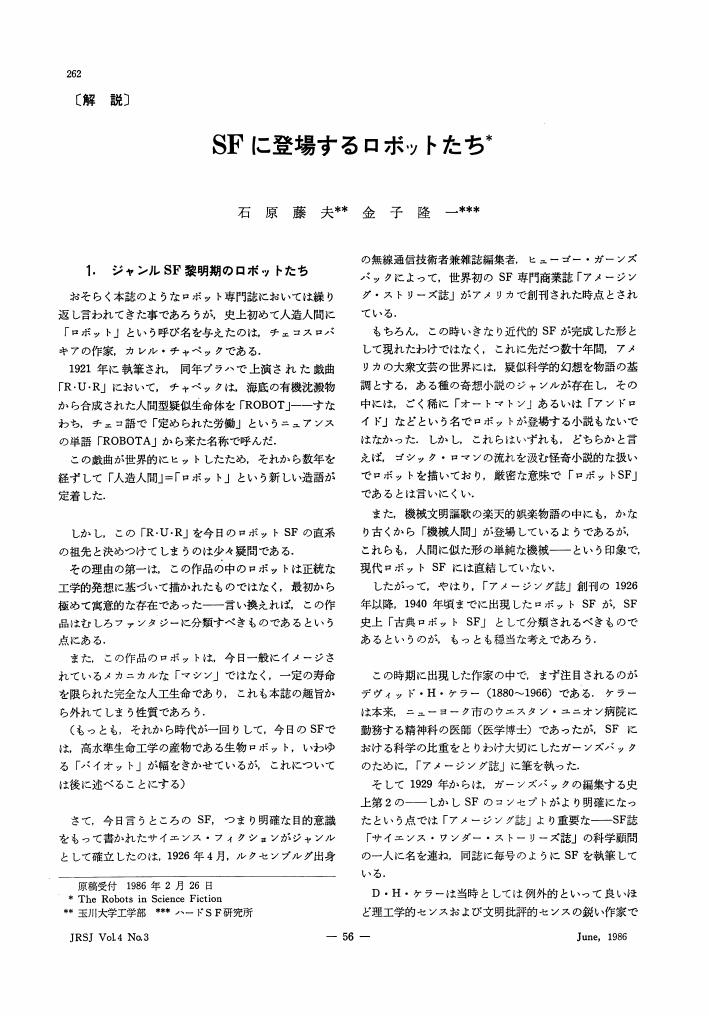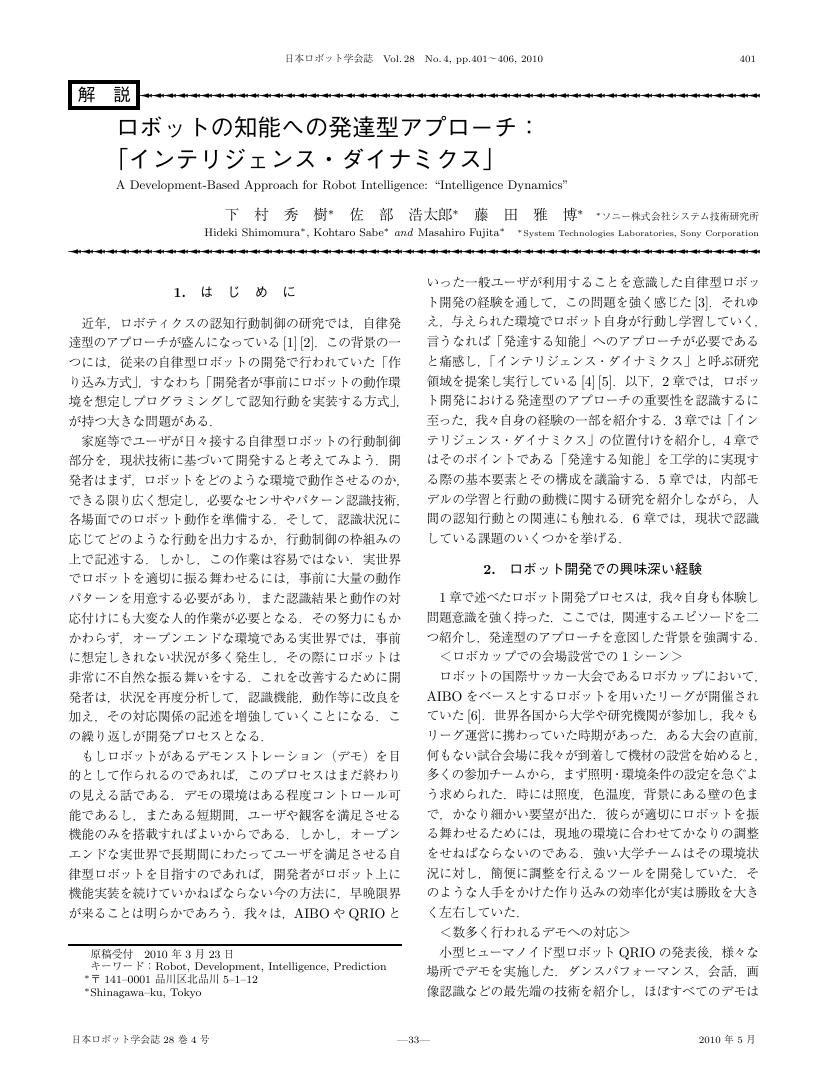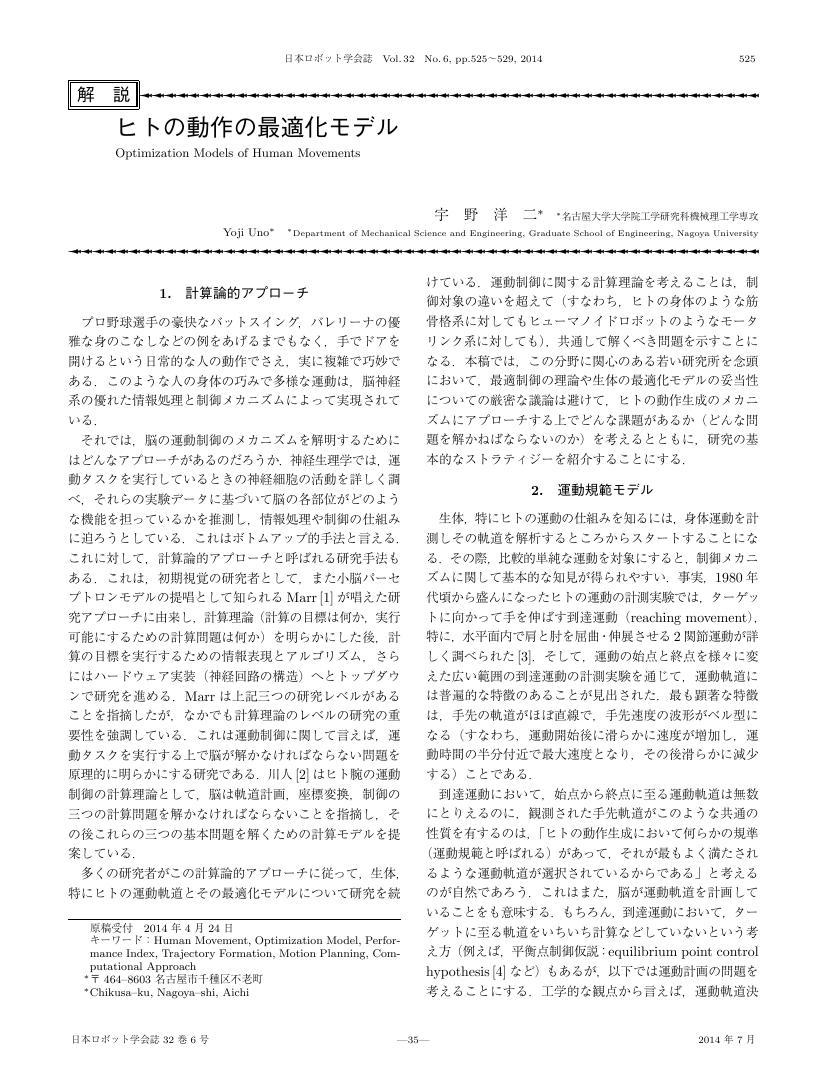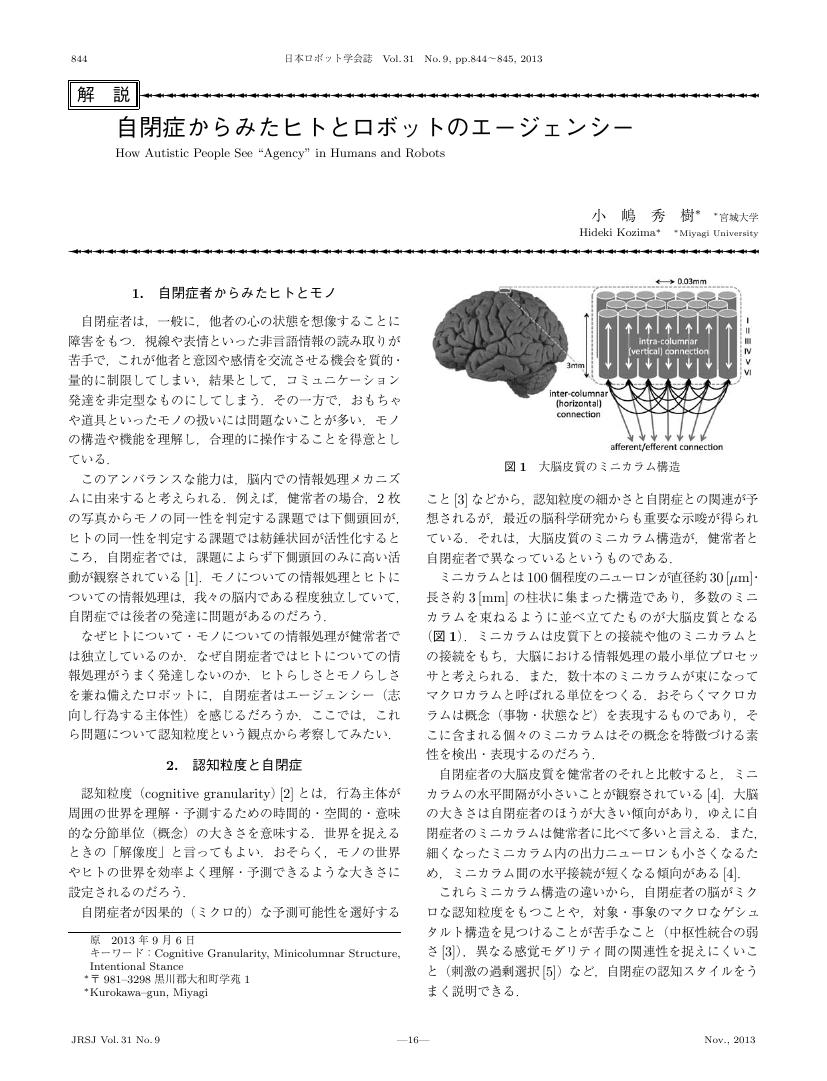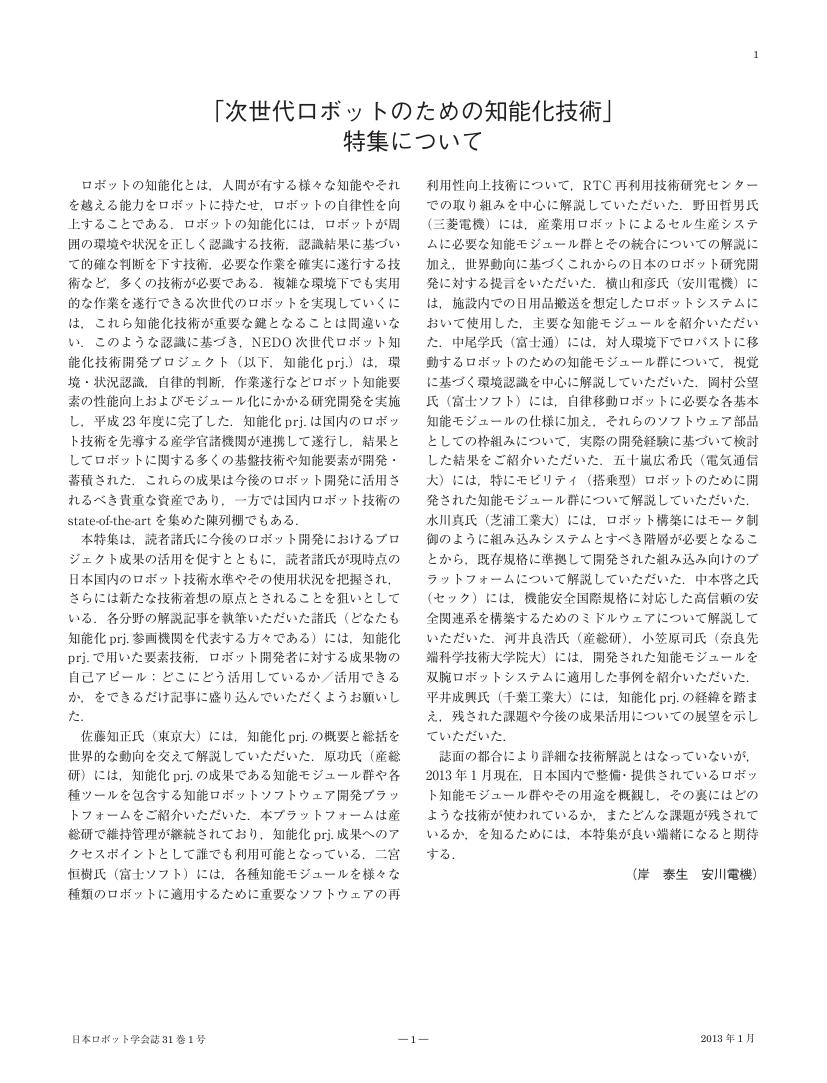3 0 0 0 OA SFに登場するロボットたち
- 著者
- 石原 藤夫 金子 隆一
- 出版者
- The Robotics Society of Japan
- 雑誌
- 日本ロボット学会誌 (ISSN:02891824)
- 巻号頁・発行日
- vol.4, no.3, pp.262-267, 1986-06-15 (Released:2010-08-25)
3 0 0 0 OA 在宅酸素療法患者の外出を支援する追従型搬送移動体の開発
- 著者
- 遠藤 玄 谷 篤 福島 E.文彦 広瀬 茂男 入部 正継 田窪 敏夫
- 出版者
- 一般社団法人 日本ロボット学会
- 雑誌
- 日本ロボット学会誌 (ISSN:02891824)
- 巻号頁・発行日
- vol.30, no.8, pp.779-787, 2012 (Released:2012-11-15)
- 参考文献数
- 15
- 被引用文献数
- 1
Home oxygen therapy (HOT) is a medical treatment for patients suffering from severe lung diseases. Although a walk in an outdoor environment is recommended for the patients to keep physical strength, patients always have to carry a portable oxygen supplier which is not sufficiently light weight for the patients. Our ultimate goal is to develop a mobile robot carrying an oxygen tank and follows a foregoing patient in an urban outdoor environment. We have proposed a mobile robot with a tether interface to detect the relative position of the foregoing patient. In this paper, we improve mobile platform mechanisms and active wheels to maximize the negotiating step height, and to allocate sufficient luggage area in the main body carrying an actual oxygen tank. The following control algorithm is also improved and demonstrate its effectiveness in an outdoor following experiment.
3 0 0 0 OA リリスボット―生活支援ロボット―の構想
3 0 0 0 OA 化学ロボット:自己組織化し自律運動する油滴
- 著者
- 池上 高志
- 出版者
- 一般社団法人 日本ロボット学会
- 雑誌
- 日本ロボット学会誌 (ISSN:02891824)
- 巻号頁・発行日
- vol.28, no.4, pp.435-444, 2010 (Released:2012-01-25)
- 参考文献数
- 49
- 被引用文献数
- 2 2
Here we will discuss the Self-organization of autonomous embodied motion [5]. Despite being a major characteristic of living systems, Self-movement has never been viewed seriously as a central element of living systems. In fact, most current research focuses on ‘structure’ rather than ‘movement’. The theory of autopoiesis [35] also does not examine biological movement directly. However, Self-movement often appears as a central theme in robotics research, its self-organization has scarcely been studied. Self-organization of Self-motion is important, because We need to understand the natural intelligence of living systems, opposed to artificial intelligence, its diversity and its root in evolution. As a means for approaching these challenges in robotics research, we designed a simple chemical system that synthesizes embodied autonomous motion: a self-moving oil droplet. This chemical system provides a new example of self-movement besides biological systems and mechanical robots.
3 0 0 0 OA 原子炉容器出入口管台高速化INLAY技術
- 著者
- 下鍋 典昭 大西 献 大平 真 日並 一幸 杉浦 篤
- 出版者
- 一般社団法人 日本ロボット学会
- 雑誌
- 日本ロボット学会誌 (ISSN:02891824)
- 巻号頁・発行日
- vol.30, no.1, pp.47-48, 2012 (Released:2012-02-15)
- 参考文献数
- 4
- 被引用文献数
- 1
3 0 0 0 OA ロボットの移動機構に関する研究動向
- 著者
- 山下 淳 淺間 一 新井 民夫 太田 順 金子 透
- 出版者
- 日本ロボット学会
- 雑誌
- 日本ロボット学会誌 (ISSN:02891824)
- 巻号頁・発行日
- vol.21, no.3, pp.282-292, 2003-04-15 (Released:2010-08-25)
- 参考文献数
- 98
- 被引用文献数
- 6 22
The wheeled robot's ability is one of the most important factors which is influential with efficiency of achieving tasks by robots. Demands for mobile robots change where environment and purpose does, therefore various mechanisms of mobile robots are proposed. However, there is no standard or general guideline of designing moving mechanisms. In this paper, we classify and denote characteristics of moving mechanisms systematically, and indicate the guideline when we design them. Especially we describe omnidirectional robots and irregular terrain robots.
3 0 0 0 OA 動作行動開発のための物理エンジンSpringhead
- 著者
- 長谷川 晶一 三武 裕玄 田崎 勇一
- 出版者
- 一般社団法人 日本ロボット学会
- 雑誌
- 日本ロボット学会誌 (ISSN:02891824)
- 巻号頁・発行日
- vol.30, no.9, pp.841-848, 2012 (Released:2012-12-15)
- 参考文献数
- 20
- 被引用文献数
- 5
3 0 0 0 OA ロボットミドルウェアの実時間処理・排他処理の比較
- 著者
- 安藤 慶昭
- 出版者
- 一般社団法人 日本ロボット学会
- 雑誌
- 日本ロボット学会誌 (ISSN:02891824)
- 巻号頁・発行日
- vol.34, no.6, pp.366-369, 2016 (Released:2016-08-15)
- 参考文献数
- 15
- 被引用文献数
- 1
3 0 0 0 OA 強化学習MOSAIC: 予測性によるシンボル化と見まね学習
- 著者
- 鮫島 和行 銅谷 賢治 川人 光男
- 出版者
- The Robotics Society of Japan
- 雑誌
- 日本ロボット学会誌 (ISSN:02891824)
- 巻号頁・発行日
- vol.19, no.5, pp.551-556, 2001-07-15 (Released:2010-08-25)
- 参考文献数
- 14
- 被引用文献数
- 6 9
3 0 0 0 4足歩行機械の間欠トロット歩容 - 全方向歩行の動的制御 -
- 著者
- 米田 完 飯山 浩幸 広瀬 茂男
- 出版者
- 一般社団法人 日本ロボット学会
- 雑誌
- 日本ロボット学会誌 (ISSN:02891824)
- 巻号頁・発行日
- vol.14, no.6, pp.881-886, 1996-09-15
- 参考文献数
- 14
- 被引用文献数
- 10 11
This paper discusses an algorithm to make quadruped machine walk dynamically and omnidirectionally following a real-time command. To produce a smooth body motion in a high speed walk, we introduce a new gait named “Intermittent trot gait, ” in which four-leg-supporting phase and two-diagonal-leg-supporting phase appear in orders. In this gait, pitching and rolling motion of the body is able to be suppressed to smaller level than that of the other gaits such as pace, bounce, and expanded trot gait, which is an intermediate gait of the crawl and the trot. Because, dynamic effects of the swinging legs are almost canceled each other. To realize the “Intermittent trot gait, ” new algorithms to decide a landing point and to plan a motion of the body are discussed. A landing point is decided by considering an operator command and also a conversion to the standard leg formation. On the other hand, a motion of the body is planned to produce a dynamic stability, and to follow a speed and direction command. By using these algorithms, a mechanical vehicle TITAN VI could walk omnidirectionally, smoothly following a real-time operator command.
3 0 0 0 OA ロボットの知能への発達型アプローチ:「インテリジェンス・ダイナミクス」
- 著者
- 下村 秀樹 佐部 浩太郎 藤田 雅博
- 出版者
- 一般社団法人 日本ロボット学会
- 雑誌
- 日本ロボット学会誌 (ISSN:02891824)
- 巻号頁・発行日
- vol.28, no.4, pp.401-406, 2010 (Released:2012-01-25)
- 参考文献数
- 22
- 被引用文献数
- 1
3 0 0 0 OA 深宇宙探査機の自律化とその検証
- 著者
- 高玉 圭樹 中谷 一郎
- 出版者
- The Robotics Society of Japan
- 雑誌
- 日本ロボット学会誌 (ISSN:02891824)
- 巻号頁・発行日
- vol.21, no.5, pp.488-493, 2003-07-15 (Released:2010-08-25)
- 参考文献数
- 13
- 被引用文献数
- 1 1
3 0 0 0 客引きロボット導入に向けた社会実験
- 著者
- 石 超 佐竹 聡 神田 崇行 石黒 浩
- 出版者
- 一般社団法人 日本ロボット学会
- 雑誌
- 日本ロボット学会誌 (ISSN:02891824)
- 巻号頁・発行日
- vol.35, no.4, pp.334-345, 2017 (Released:2017-06-15)
- 参考文献数
- 34
- 被引用文献数
- 12
We conducted a field study to investigate the social acceptance of social robots by stores, particularly for attracting passersby, which today's robots can autonomously perform. From interviews with ten store managers, we identified two main reasons they want to employ such social robots in their stores: robots offer cheap labor and provide unique value that humans cannot. They believe that robots are good at attracting the attention of visitors without causing or receiving stress. We also conducted three case studies in which we observed how store managers employed social robots in their stores. Each store manager requested different designs in the preparation phase. After deployment, we found that the managers were generally satisfied with the services autonomously offered by the robots, which successfully encouraged people to stop. For two out of three stores the robots successfully encouraged visitors to visit. The store managers were satisfied with the results and expressed a desire to use the robots again.
3 0 0 0 OA ヒトの動作の最適化モデル
- 著者
- 宇野 洋二
- 出版者
- 一般社団法人 日本ロボット学会
- 雑誌
- 日本ロボット学会誌 (ISSN:02891824)
- 巻号頁・発行日
- vol.32, no.6, pp.525-529, 2014 (Released:2014-08-15)
- 参考文献数
- 16
- 被引用文献数
- 2 5
3 0 0 0 OA 球による動力伝達機構を用いたアクティブキャスタの運動解析と機構設計
- 著者
- 和田 正義 井上 雄介 平間 貴大
- 出版者
- 一般社団法人 日本ロボット学会
- 雑誌
- 日本ロボット学会誌 (ISSN:02891824)
- 巻号頁・発行日
- vol.31, no.6, pp.591-598, 2013 (Released:2013-08-15)
- 参考文献数
- 14
- 被引用文献数
- 1 1
This paper presents a new wheel mechanism for the active-caster drive system. The active-caster provides omnidirectional mobility with no using free rolling mechanism. The original active-caster equips with an absolute encoder to detect a wheel orientation and two motors for driving wheel and steering axis independently. A computer system needs to detect an absolute wheel orientation and coordinate velocity components for wheel and steering drive to provide wheel motion in an arbitrary direction. To simplify the wheel control system, a new active-caster mechanism is proposed. A proposed active-caster system includes a ball transmission to distribute a traction velocity to wheel and steering axis mechanically without using an angle sensor or coordinated motor control. In this paper, kinematics of the proposed wheel mechanism is analyzed and mechanical condition for realizing the caster motion is derived. A kinematic model of the proposed active-caster mechanism with a ball transmission is analyzed and a mechanical condition for realizing caster motion is derived. Based on the kinematic model and the mechanical condition, computer simulations of the mechanism are performed. In the simulations, the active-caster shows successful caster motions with no sensor or computer system.
3 0 0 0 OA 制御系に埋め込まれた陰的制御則が適応機能の鍵を握る!?
- 著者
- 大須賀 公一 石黒 章夫 鄭 心知 杉本 靖博 大脇 大
- 出版者
- 一般社団法人 日本ロボット学会
- 雑誌
- 日本ロボット学会誌 (ISSN:02891824)
- 巻号頁・発行日
- vol.28, no.4, pp.491-502, 2010 (Released:2012-01-25)
- 参考文献数
- 24
- 被引用文献数
- 7 11
In this note, we consider a control system that underlies in a biological system. We point out the existence of the Problem of Inseparability in the control system. To understand the principle of mobile adaptability embedded in the control system, we have to solve the Problem of Indivisibility. To solve the problem, we propose a concept of Implicit control law. Finally, we show the Implicit control law plays an important role for constructing the adaptive function of living thing and robot.
3 0 0 0 OA 自閉症からみたヒトとロボットのエージェンシー
- 著者
- 小嶋 秀樹
- 出版者
- 一般社団法人 日本ロボット学会
- 雑誌
- 日本ロボット学会誌 (ISSN:02891824)
- 巻号頁・発行日
- vol.31, no.9, pp.844-845, 2013 (Released:2013-12-15)
- 参考文献数
- 5
3 0 0 0 OA 3D荒地用歩行ロボットの研究
- 著者
- 有川 敬輔 広瀬 茂男
- 出版者
- 日本ロボット学会
- 雑誌
- 日本ロボット学会誌 (ISSN:02891824)
- 巻号頁・発行日
- vol.13, no.5, pp.720-726, 1995-07-15 (Released:2010-08-10)
- 参考文献数
- 11
- 被引用文献数
- 2 7
The mobile robots which can walk around and perform several tasks over 3D terrain, a generalized terrain including the surface of wall and ceiling of large constructions are highly demanded. We discuss the control of the leg motion of quadruped-wall-climbing-robot specifically designed for 3D terrain from the view point of two design and control concepts which we have already proposed, the GDA, or gravitationally decoupled actuation, and Coupled Drive. The GDA was introduced to eliminate negative power consumption and improve energy efficiency in ground walking, and the Coupled Drive was introduced to evenly distribute power generation among installed actuators, decrease the weight of the actuation mechanism, and enable powerful walking in wall climbing motion. In this article we propose a new control method to adaptively select walking postures in both ground walk and wall climbing and optimize the walking performances in terms of the concepts of GDA and Coupled Drive. We made simulation experiments considering actual actuation characteristics, standing motion constraint and other boundary conditions and shows that the introduced control improve walking performance in 3D terrain well.
3 0 0 0 OA 「次世代ロボットのための知能化技術」特集について
- 著者
- 岸 泰生
- 出版者
- 一般社団法人 日本ロボット学会
- 雑誌
- 日本ロボット学会誌 (ISSN:02891824)
- 巻号頁・発行日
- vol.31, no.1, pp.1-1, 2013 (Released:2013-02-17)
- 被引用文献数
- 1 1
3 0 0 0 OA 特集「知能ロボット」について
- 著者
- 佐藤 知正
- 出版者
- 一般社団法人 日本ロボット学会
- 雑誌
- 日本ロボット学会誌 (ISSN:02891824)
- 巻号頁・発行日
- vol.5, no.6, pp.461-461, 1987-12-15 (Released:2010-08-25)
